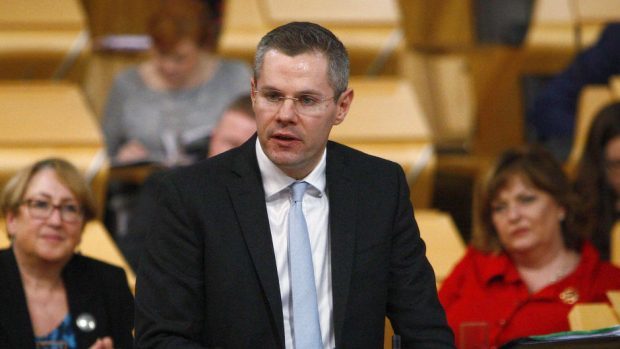A competitive and thriving north-east economy has a major part to play in ensuring we have a competitive and thriving Scottish economy.
That’s why we are backing the north-east with an additional quarter of a billion pounds of investment alongside the Aberdeen City Region Deal, three-quarters of a billion pounds for the Aberdeen Western Peripheral Route, and improvements on the A90-A96 Haudagain Junction and development work for the new Laurencekirk junction – to name just a few examples.
And we stand firmly with Aberdeen’s energy industry, supporting renewables and decommissioning, but also backing our oil and gas industry during challenging times with support for innovation, retraining and business resilience.
However, when businesses in the north-east raise concerns about their competitiveness, it is my job as finance secretary to listen.
The Budget I published before Christmas includes measures to help with the rates revaluations and to support our commitment to Scotland being the best place in the UK to do business.
Firstly, by raising the threshold for 100% rate relief under the Small Business Bonus to £15,000 rateable value, over 6,000 businesses in Aberdeen and Aberdeenshire will simply not have to pay rates at all.
That’s a saving of up to £6,990 and means two out of every five local businesses in the area will not pay any rates.
Secondly, to ensure that only the largest businesses pay the large business supplement, this year’s Budget increases the threshold, so it only applies to businesses with a rateable value over £51,000 – meaning 400 fewer big businesses in the area will pay the supplement, saving them money.
And, because we recognised that the revaluation of business properties being undertaken by the independent assessors for the local authorities would see an increase in rates bills for some businesses, I took the decision to cut the tax rate that applies to a property’s rateable value – by 3.7% to 46.6p in the pound, supporting all those businesses who do have to pay rates.
There will always be a range of effects associated with a revaluation, which re-sets the relative value between individual properties, sectors and localities and I have heard the voices of those businesses who are seeing a rise in their rateable value and are concerned about meeting those costs.
The first step open to all those businesses who are concerned is to contact the assessor and discuss how they worked out the provisional value.
Final valuations will be published in March and businesses have until September to appeal. That process is entirely independent and I hope firms take up those opportunities.
At the same time, I can confirm the Scottish Government is listening. I’ve heard calls for a national “transitional relief” scheme to follow the revaluation. This would mean not just phasing in large increases in bills, but also phasing in reductions for many whose values have gone down.
Having looked at the impact that would have, I cannot justify keeping bills up artificially for small firms or having large utility companies – who would be the main beneficiaries – subsidised by smaller rate payers.
However, it is possible for local schemes to be put in place by local authorities. Local authorities retain all the revenue from business rates and, through our Community Empowerment Act, have the power to offer further rate reductions on top of those offered by the Scottish Government.
Local authorities can use rate reductions to attract new investment into town centres, to target specific locations or sectors of their economies or in this case, to alleviate the impact of a revaluation.
I am ready to work with both Aberdeen and Aberdeenshire on how we can maximise the benefits of this new power and work together to support north-east businesses.
Looking forward, an external review of business rates and their role in supporting economic growth is due to conclude this summer, and the government will respond swiftly.
At a time when we face the potential economic impact of a hard Brexit, which is already leading to rising prices, I am clear we must all work together to support business, foster innovation and maintain investment.
There is no doubt the north-east continues to have a strong economy and excellent potential for future growth, as does the whole of Scotland.
